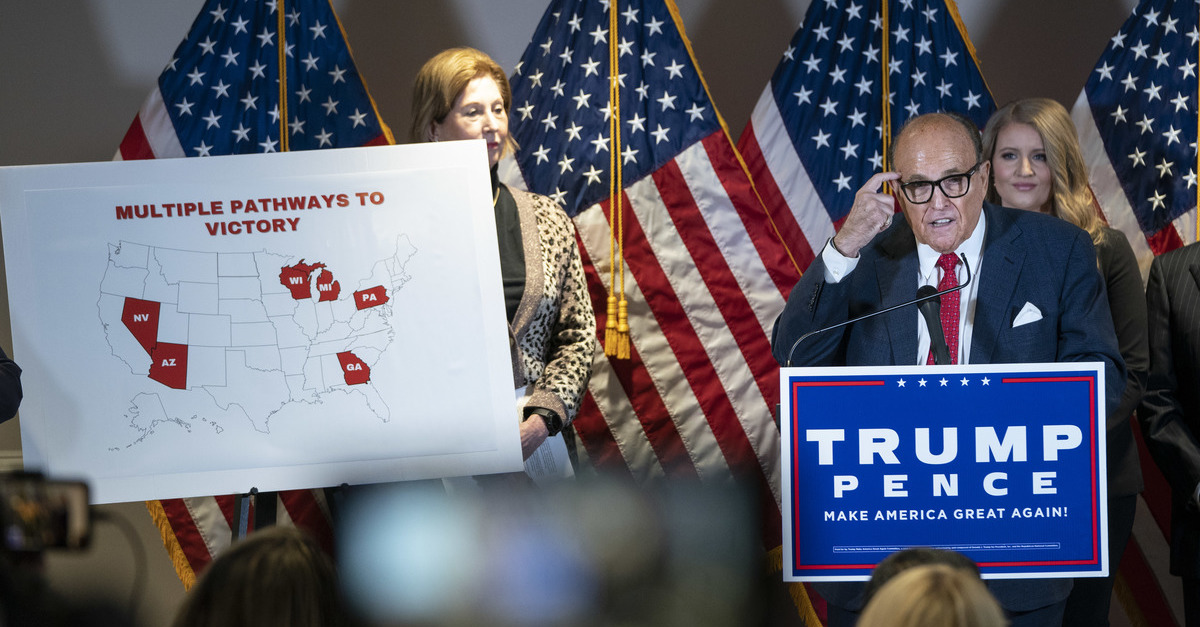
President Donald Trump wants his Supreme Court appointees to somehow, someway hand him the 2020 election that he lost, and Rudy Giuliani is “spearheading” the misguided effort to make it happen. Legal experts already said on Monday that the manner in which the Trump campaign went about appealing a resounding Pennsylvania loss to the Third Circuit is not even designed to reach SCOTUS. Worse yet, Pennsylvania’s election boards and Secretary Kathy Boockvar (D), the defendant-appellees, have asked the court to make clear to Giuliani et al. how to do an appeal—just an hour-plus ahead of a 4 p.m. deadline on Monday for the Trump campaign to file its brief.
Earlier on Monday, the Third Circuit granted Trump’s motion for an expedited review on the issue of filing a Second Amended Complaint. The Trump campaign maintains that U.S. District Judge Matthew Brann, who was a Federalist Society member, erroneously denied the campaign leave to file said amended complaint. On Saturday, Judge Brann said the Trump campaign made “strained legal arguments without merit and speculative accusations, unpled in the operative complaint and unsupported by evidence.”
“In the United States of America, this cannot justify the disenfranchisement of a single voter, let alone all the voters of its sixth most populated state. Our people, laws, and institutions demand more,” Brann said, granting a motion to dismiss—with prejudice.
Trump campaign lawyers filed a motion for expedited review and then followed that up with a widely panned amended motion for expedited review on Monday. The Third Circuit granted the request, though, and ordered Team Trump to submit their brief on or before Monday at 4 p.m.—yes, today.
Pennsylvania’s Secretary of State Kathy Boockvar was ordered to file her brief on or before Tuesday at 4 p.m. On Monday, several Pennsylvania counties and Boockvar asked the Third Circuit to clarify how this appeal ought to go:
Appellees the Allegheny County Board of Elections, Chester County Board of Elections, Montgomery County Board of Elections, and Philadelphia County Board of Elections (the “Appellee Counties”), seek clarification of the Court’s November 23, 2020 Order (Dkt. No. 9), granting the Appellants’ Amended Motion for Emergency Expedited Review to make clear that, under well-established appellate rules, Appellants’ brief must address any bases for their appeal and cannot split appellate issues in sequential briefing or engage in piecemeal litigation. Appellee Secretary Boockvar consents to this Motion for Clarification
The defendant-appellees then called out the bizarre line from the amended motion to expedited review that declared there was no case or controversy at hand. They said the Trump campaign’s incredibly flawed approach here is simply “untenable” and impermissibly “piecemeal” [emphasis in original]:
In particular, Appellants’ Amended Motion for Expedited Review states that Appellants seek only to brief issues relating to the denial of Appellant’s Motion for Leave to File a Second Amendment Complaint. See Dkt. No. 6, p. 3 ¶ 7 (Nov. 23, 2020). Appellants further contend that they believe no “case or controversy” exists over the Order dated November 21, 2020 dismissing Appellants’ Amended Complaint (No. 4:20-cv-2078, Dkt. No. 203). Id. at p.2 ¶ 5. Yet, Appellants’ Notice of Appeal only appeals from the District Court’s November 21, 2020 Order. See Notice of Appeal, No. 4:20-cv-2078, Dkt. No. 205. At the same time, Appellants claim they “do not intend to waive any claim that any part of the District Court’s decision may have been wrongly decided” and seek to leave open the opportunity to “provide supplemental briefing” on such issues. Id. at p.3. ¶ 6.
This is an untenable proposal. The partial-appeal procedure proposed by Appellants is contrary to “the historic federal policy against piecemeal appeals.” Sears, Roebuck & Co. v. Mackey, 351 U.S. 427, 438 (1956). This proposed procedure further runs counter to the final judgment rule, codified by 28 U.S.C. § 1291, which requires “that a party must ordinarily raise all claims of error in a single appeal following final judgment on the merits.” Firestone Tire & Rubber Co. v. Risjord, 449 U.S. 368, 374 (1981). Moreover, it is well established that “arguments not raised in an appellant’s opening brief are deemed waived.” United States v. Quillen, 335 F. 3d 219, 224 (3d Cir. 2003) (citing Abdul-Akbar v. McKelvie, 239 F.3d 307, 316 n.2 (3d. Cir. 2001) (en banc)); see also Fed. R. App. P. 28 (a)(8) (requirements for Appellants’ brief).
This is not to ignore other flaws in the piecemeal process proposed by Appellants, including the inefficiency of the proposal in light of Appellants’ claimed exigencies, the apparent gamesmanship in attempting to either avoid or somehow defer review of the merits of the District Court’s November 21, 2020 order—which are intimately bound in the denial of leave to amend—and bedrock preclusion principles. See Fogel v. Chestnutt, 668 F.2d 100, 109 (2d Cir. 1981) (Friendly, J.) (Driven by considerations of fairness to the parties, judicial economy, and the societal interest in finality, the law-of-the-case doctrine “applies . . . to everything decided by necessary implication in the first appeal.”).
“In light of these well-established principles, Appellee Counties ask this Court to clarify its November 23, 2020 Order granting the amended motion to expedite to make clear that Appellants’ brief must cover all issues relevant to this appeal and that the normal waiver and preclusion doctrines and prohibitions on piecemeal litigation will apply,” the motion concluded.
At the time of this writing, the Trump campaign acknowledged in a new filing that it has a 4 p.m. deadline to meet. The campaign also said that it would try to delay the certification of Pennsylvania’s election.
Legal observers noted that this is not a thing.
Pennsylvania’s certification deadline is today.
Read the motion for clarification below:
[Image via Drew Angerer/Getty Images]